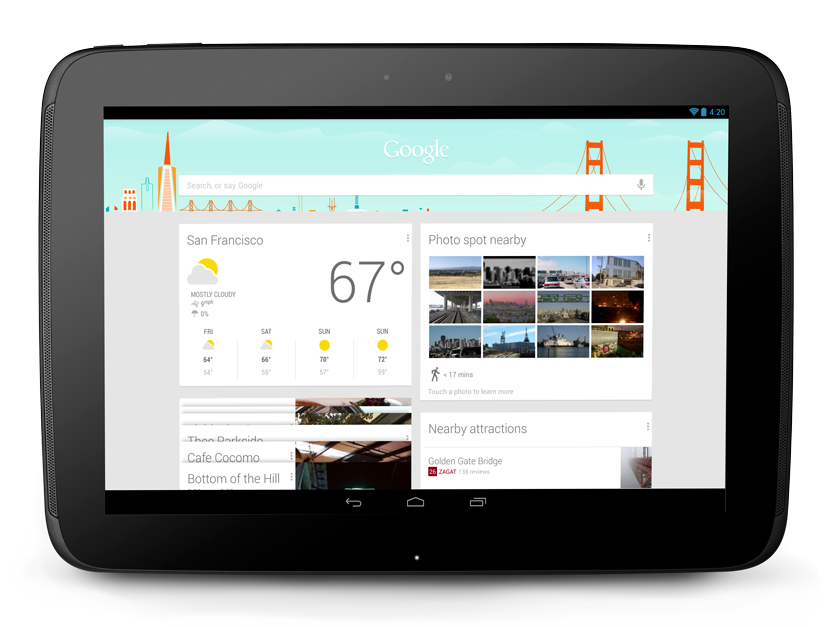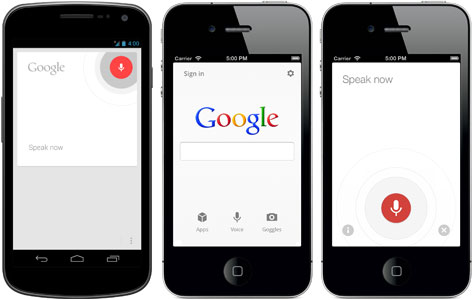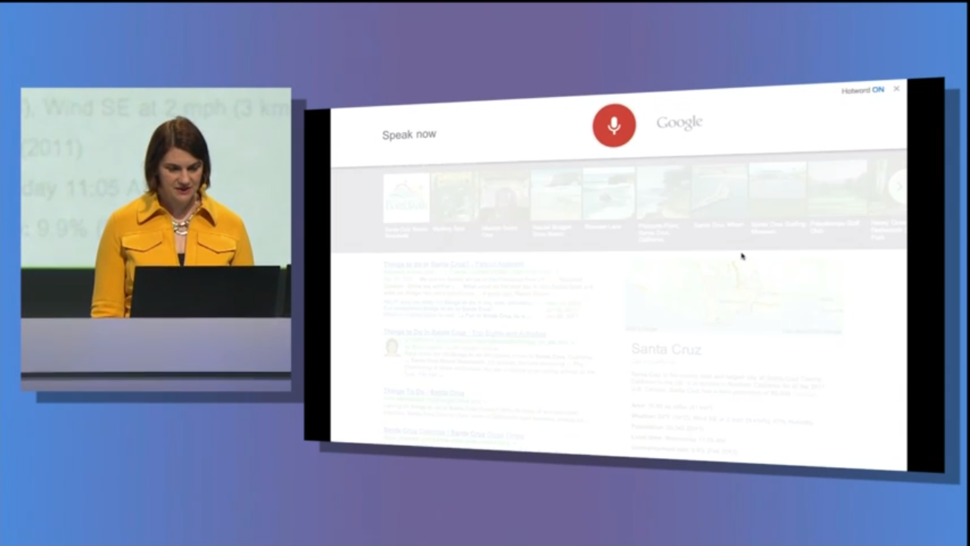#google-now
I've had an iPhone for about a year and a half now, after previously owning a Windows Phone and Palm Pre. Each time I switch platforms, there's something I miss from my previous experiences, and something I long for in a platform I haven't tried yet. For me, Google Now for Android was this feature that I so desperately wanted to try.
A couple of weeks ago, Google released an update for the Google Search app on the iPhone, with Google Now as the headline feature. A while back, it was rumored that Google would be releasing this update with Now baked in, though this rumor was shot down by Apple, and Google later admitted that Eric Schmidt's comments were not necessarily accurate (or, rather, not interpreted correctly).
Recently, Google Now was also featured at Google's I/O conference. In addition to new cards, such as location aware reminders and public transit information, Google revealed several new services designed with a similar goal to Now-- to make your life easier, and to delve deeper into your personal information.
What is Google Now?
Google Now is an assistant that is able to learn from your habits and predict your future actions. If you believe this sounds creepy, you're not alone. Many individuals have serious concerns with Google's privacy practices in general, and Google Now is evidence that they are willing to leverage the masses of data available on each of its users.

However, privacy concerns aside, Google Now is quite impressive. On Now's home screen, you are presented with a list of cards, which each represent a different piece of information. The standard weather card, which changes based on your location, and sports scores are available, but the magic of Now is in its predictive capabilities.
If you allow it, Google Now will look through your email, calendar, search history, and location history to give you information about traffic on the drive to work or updates on the package you ordered from Amazon. Your location and search history are key to Now's full experience, because it allows Google to track everywhere you've been and everywhere you're going. Though many are afraid of a company, who's primary source of revenue is advertising, knowing all of this information, Now is able to use your history to your advantage and present information that will be useful to you. This is why Google Now is important-- primarily, it doesn't present information you've asked for, but information you will need for in the future-- without actually asking for it.
Interestingly, all of this is only possible because Google was behind it. Any startup could have come up with a similar concept, but the product would lack the integration that Now has. Because Google likely manages quite a bit of your life, whether it's your email, calendar, bus route, or school papers, they can extract information from each of these individual services to piece together a picture of your life you didn't even know existed.
The Omnipresent Assistant
Imagine a traditional office assistant that knows your work and travel schedule, manages your calendar, and occasionally arranges business related dinners and activities. But this is where it ends-- your office assistant has no access to your personal life or your weekend plans, for the most part. Google has, in some ways, built a perfect assistant. It completes your sentences, listens to your voice, and presents you with information related to your current and future locations. Not only does it do all of this, but it does it all the time.
Half of the people that use Now, including myself, gawk at this concept. What was formally a perk of a high-power position in a notable company is now available on your phone. While it doesn't actually make restaurant reservations for you, it is only a matter of time before Google integrates with Open Table or provides its own competitor in the space.
Now for Android already provides half of this experience-- your Fandango tickets and airline boarding passes are automatically displayed for scanning. Combine this with Siri's ability to purchase movie tickets (yes, it does open the Fandango app, though this is not a bad thing-- purchases should always require explicit human intervention), and you suddenly can manage the majority of your social life from an app.
The other side of the fence is critical of Now's always-on design. It tracks your location and search history, and in the case of Android phones, how many steps you take and miles biked. All of this data can be used to build a profile on every internet connected individual on an unprecedented scale. Theoretically, Google, among other social networks and applications, knows what you like to eat, what your favorite movie theatre is, and other facts about yourself. I would bet, from the data set that represents you as an individual, Google could determine your favorite color and animal, any various other tidbits of information that you'd probably only extract from another human being after a decently in-depth conversation.
If Google knows all of this, what is to stop them from using the information to sell you more of your favorite pink socks or recommend specific medication for an illness you've contracted? Where does the company's bounds end? Personally, I might be embarrassed if Google Now tried to inform me that a particular medication was available at a store nearby, despite their benevolent intentions. I believe some information is best kept from the public eye and best left to doctors, therapists, significant others, or those blood related to me. Yet, with all the information we feed through Google's inlets, intentionally or otherwise, Google already knows all of this private information.
Talking to Your Computer
While Voice has been built into Google's search application for Android, iOS, and Chrome and has been a part of Google Now, they have also made a push to make voice search easier on the desktop. With a simple "hot-word" phrase, "Ok, Google", you can trigger voice search without touching your keyboard. While this is a neat feature, it also highlights another privacy concern-- your web browser is always "listening" to what you say and is waiting to "hear" the key phrase.
The technology does not truly record all of your conversations (or even listen to them in the "traditional" sense of understanding every word you say), but the idea behind your computer listening to you all the time is unsettling to some. If you sing along to your music or talk to yourself while you're alone in your home or office, the hot-word triggered voice search may mean you aren't truly alone-- your computer is there with you, and listening.

Search is Now Personal
Another feature demoed by Google at I/O is the ability to search through your personal photos and calendar from the Google website. A query, such as "my photos from my trip to Las Vegas last year," will pull up your Google+ album containing the photos you requested. Additionally, similar searches for "my airline reservation" or "my restaurant reservation" will pull up the appropriate personalized results.
This conversational search feature is related to Now in an important way-- it's another input for Now to gather data from. All of this personal information is being pulled together by Google to form the future of technology-- a personalized, searchable, predictive "knowledge graph" that is tailored to each individual person. All of Google's products, including Gmail, Search, Calendar, and even Android, are sensory inputs for what is the Google "brain"--the knowledge graph--that contains information on nearly every person, business, landmark, and entity in the known universe. Google Now, as well as the new voice search products, are simply ways for us to access this brain.

Now is the Future
Whether you like it or not, you can keep no secrets from Google. Your past, no matter how dark, is reflected in your search history. While Google does anonymize search data after a period of time, it was associated with you-- an individual-- for some time. And if you consent, your location history may reveal which "adult" stores are your favorites to visit-- even if you forgot that you ever enabled the location history in the first place. Storage is cheap, so keeping all of this data around is trivial for a company as large as Google. And in the future, it'll only become easier.
But if you can live in ignorance, or minimally trust Google with your data, Google Now is representative of the future of technology-- an organic, learning piece of software that helps you get through the day. If I can save myself the headache of being late to work or a meeting due traffic, Now is worth the tradeoff.
Some people may even find it odd that I want to provide even more data to Google through avenues such as the Play Store All Access Music subscription so that I can get personalized recommendations for music in Now, but I am constantly fascinated at Google's ability to turn up so much information on me that even I didn't know.
I may be selling myself and habits to a company dedicated to advertising, but nothing comes free.
Do you enjoy my writing?
Follow me on Twitter to find out when I write new articles. You can also add me to your circles on Google+. I promise, I won't tweet about what I had for dinner!